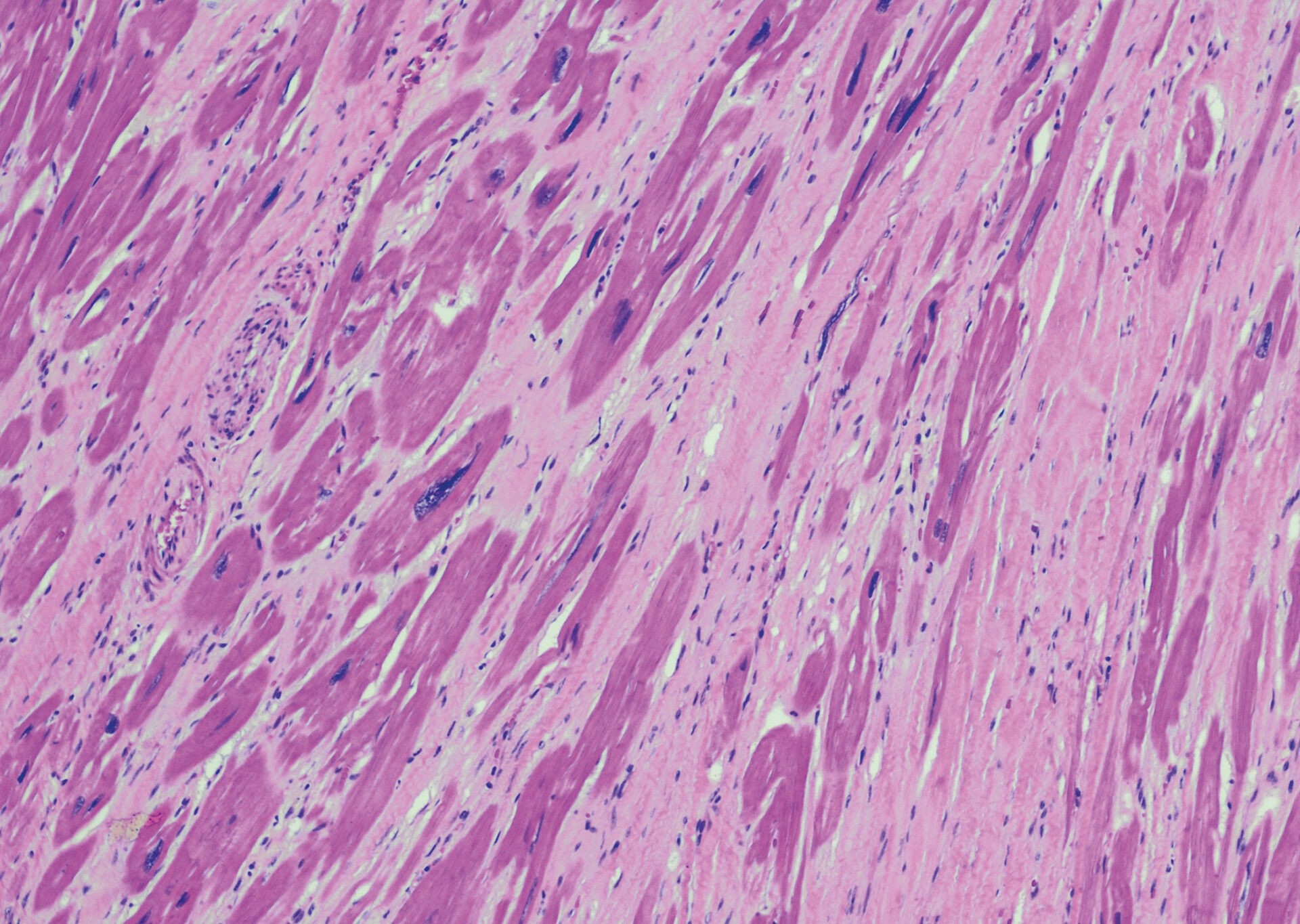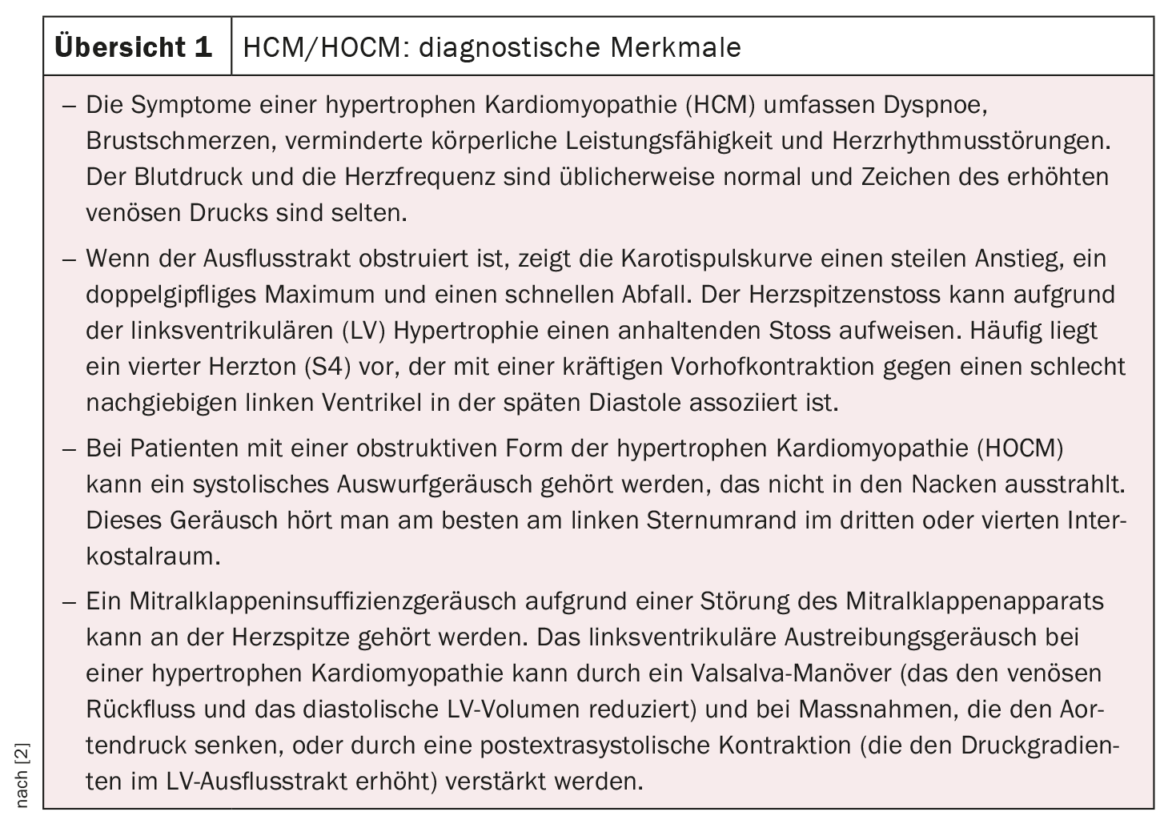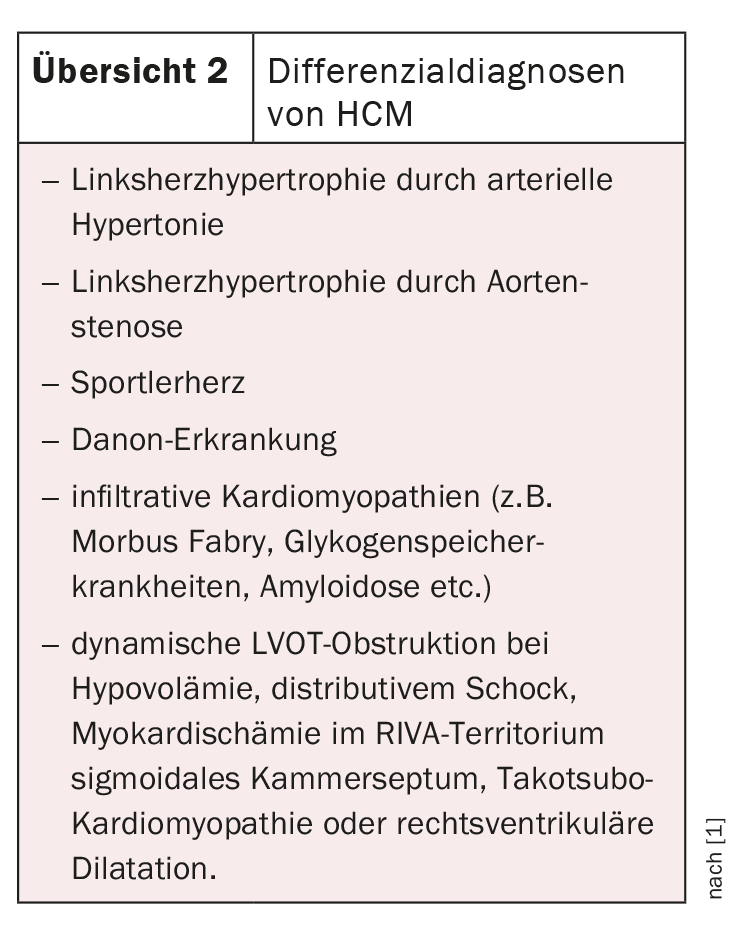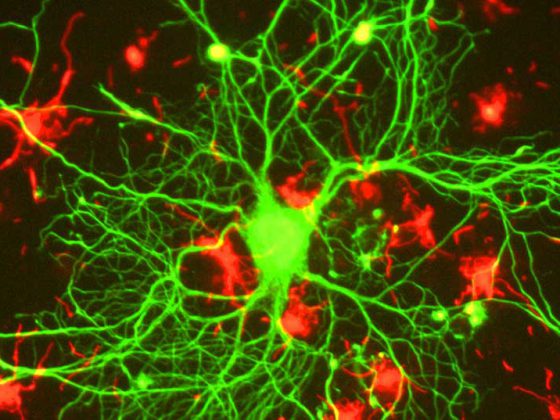Hypertrophic cardiomyopathies are characterized by a thickening of the heart muscle without accompanying dilatation. In 70% of cases, there is an obstruction of the left ventricular outflow tract, which is referred to as hypertrophic obstructive cardiomyopathy (HOCM). Since last year, a drug therapy option has been available for HOCM for the first time that targets the pathophysiology.
Most cases of hypertrophic cardiomyopathy (HCM) are due to a genetic defect. The diagnosis is made clinically (Overview 1), whereby imaging findings are indicative and allow differential diagnoses to be excluded. In addition to ECG, echocardiography (including pulsed-wave Doppler and continuous wave Doppler) and cardio-MRI are used in particular [1]. The X-ray findings may be normal or show non-specific features (e.g. cardiomegaly or pulmonary venous congestion). [2] Important differential diagnoses of HCM are summarized in Overview 2 [1].
The myosin inhibitor mavacamten
In adults with symptomatic hypertrophic obstructive cardiomyopathy (HOCM), mavacamten (Camzyos®) can be used to improve exercise capacity and minimize disease symptoms [3,4]. The oral medication normalizes contractility, reduces dynamic obstruction in the left ventricular outflow tract (LVOT) and improves cardiac filling pressures and biomarkers of cardiac stress. Mavacamten reduces increased myosin bridges in the sarcomere of the heart muscle, which underlie the increased contractility and also the worsened relaxation, explained Prof. Dr. med. Stephan Achenbach, Clinic for Cardiology and Angiology, University Hospital Erlangen [5]. The approval of mavacamten was based on the results of the two Phase III studies EXPLORER-HCM and VALOR-HCM.
EXPLORER-HCM study
According to Prof. Achenbach [5], this randomized controlled, double-blind, multicentre parallel group study showed that the outflow tract gradient is significantly reduced. Included were 251 adult patients with NYHA class II and III HOCM, LVEF ≥55% and a peak LVOT gradient of ≥50 mmHg at rest or under provocation at the time of HOCM diagnosis and a LVOT gradient under Valsalva maneuver of ≥30 mmHg at pretest [7]. The demographic and disease-related characteristics at baseline were balanced. The average age was 59 years (85 patients were ≥65 years old).
The study participants received either mavacamten at a starting dose of 5 mg (n=123) or placebo (n=128) once daily over a period of 30 weeks. The dose was regularly adjusted to optimize patient response (reduction in LVOT gradient under Valsalva maneuver) and maintain an LVEF ≥50%. Treatment allocation was stratified by NYHA class (II or III), current treatment with beta-blockers (yes or no) and type of device used to measure maximal oxygen uptake (pVO2) (treadmill or exercise bike) at baseline. Background HCM therapy was given to 96% of participants in the mavacamten arm (76% beta blockers, 20% calcium antagonists) and 87% in the placebo arm (74% beta blockers, 13% calcium antagonists). Patients receiving dual background therapy with beta-blockers and calcium antagonists or disopyramide or ranolazine were excluded.
The results of the EXPLORER-HCM study were published in the Lancet [8]. At week 30, a greater proportion of patients treated with mavacamten compared to placebo had achieved the primary and secondary endpoints (improvement in pVO2 by ≥1.5 ml/kg/min and an improvement in NYHA class by at least 1 level OR an improvement in pVO2 by ≥3.0 ml/kg/min and no worsening of NYHA class).
The results of the 56-week long-term analyses of EXPLORER-HCM were as follows [9]:
- Mavacamten showed a sustained reduction in peak LVOT gradient at rest: -34.0 mmHg for the original mavacamten group and -33.2 mmHg for the placebo crossover group.
- The proportion of patients with NYHA improvement by ≥1 class was observed in 93% of patients in the original mavacamten group by week 56 and in 73% of patients from the placebo crossover group by week 40.
- On the 23-point questionnaire completed by the patients Kansas City Cardiomyopathy Questionnaire Clinical Summary Score (KCCQ-23 CSS), the mean scores for symptom frequency, symptom burden and physical limitation improved further, by 14.1 points in the original mavacamten group (95% CI; 9.9-18.3) and by 11.7 points in the placebo crossover group (95% CI; 6.9-16.4).
- Mavacamten has also been associated with a sustained reduction in biomarkers of cardiac wall stress and myocardial damage, including a reduction in N-terminal pro B-type natriuretic peptide (NT-proBNP) and a reduction in cardiac troponin I.
- No new safety signals were observed; safety and efficacy were comparable in both patient groups.
VALOR-HCM long-term data
The VALOR-HCM study included HOCM patients who had a peak LVOT gradient of ≥50 mmHg at rest or under provocation and an LVEF ≥60% during maximum drug therapy and who had been referred or actively considered for septal reduction therapy within the past 12 months [7]. Patients were randomized in a 1:1 ratio to once-daily mavacamten or placebo. The dose was adjusted at regular intervals within the dose range of 2.5 mg to 15 mg in order to optimize patient response. The results of the long-term data (56 weeks) of the VALOR-HCM study were published in JAMA Cardiology [10]. The most important results at a glance [9,10]:
- 8.9% of patients (n=5) in the original mavacamten group and 19.2% (n=10) in the placebo crossover group opted for or were eligible for septal reduction therapy (SRT) at week 40.
- Mavacamten showed a sustained reduction in peak LVOT gradient at rest: -34.0 mmHg for the original mavacamten group and -33.2 mmHg for the placebo crossover group.
- NYHA improvement by ≥1 class was observed in 93% of patients in the original mavacamten group by week 56 and in 73% of patients in the placebo crossover group by week 40.
- On the 23-point questionnaire completed by the patients Kansas City Cardiomyopathy Questionnaire Clinical Summary Score (KCCQ-23 CSS), the mean scores for symptom frequency, symptom burden and physical limitation improved further, by 14.1 points in the original mavacamten group (95% CI; 9.9-18.3) and by 11.7 points in the placebo crossover group (95% CI; 6.9-16.4).
In addition, mavacamten was associated with a sustained reduction in biomarkers of cardiac wall stress and myocardial damage, including a reduction in NT-proBNP of -376 ng/L in the original mavacamten group and -423 ng/L in the placebo crossover group, and a reduction in cardiac troponin I of -7.0 ng/L in the original mavacamten group and -6.2 ng/L in the placebo crossover group. No new safety signals were observed in the VALOR-HCM study either; safety and efficacy were comparable in both patient groups. The most common adverse effects of mavacamten include dizziness and heart failure [6].
Congress: DGK Cardio Update
Literature:
- “Cardiomyopathy”, https://flexikon.doccheck.com/de/Hypertrophe_Kardiomyopathie,(last accessed 05.04.2024)
- “Hypertrophic cardiomyopathy”, www.msdmanuals.com/de/profi/herz-kreislauf-krankheiten/kardiomyopathien/hypertrophe-kardiomyopathie,(last accessed 05.04.2024)
- Swissmedic: Medicinal product information, www.swissmedicinfo.ch,(last accessed 05.04.2024)
- Swissmedic: Public Summary, www.swissmedic.ch/swissmedic/de/home/ueber-uns/publikationen/public-summary-swiss-par/public-summary-swiss-par-camzyos.html,(last accessed 05.04.2024)
- “Cardiomyopathies, storage diseases and myocarditis”, Prof. Dr. med. Stephan Achenbach, 19th DGK Cardiology Update Seminar, 23-24.02.2024, Mainz/ Livestream.
- PharmaWiki: Mavacamten, www.pharmawiki.ch,(last accessed 05.04.2024)
- European Medicines Agency (EMA),
https://ec.europa.eu/health/documents/community-register/2023/20230626159388/anx_159388_de.pdf,(letzter Abruf 05.04.2024) - Olivotto I, et al: EXPLORER-HCM study investigators. Mavacamten for treatment of symptomatic obstructive hypertrophic cardiomyopathy (EXPLORER-HCM): a randomized, double-blind, placebo-controlled, phase 3 trial. Lancet 2020; 396(10253): 759-769.
- “Long-Term Follow-Up Data from Two Phase 3 Studies of CAMZYOS® (mavacamten) Demonstrate Consistent and Durable Response in Patients with Symptomatic Obstructive Hypertrophic Cardiomyopathy (HCM)”, Bristol Myers Squibb, 08.28.2023.
- Desai MY, et al: Myosin Inhibition in Patients With Obstructive Hypertrophic Cardiomyopathy Referred for Septal Reduction Therapy. J Am Coll Cardiol 2022; 80(2): 95-108.
CARDIOVASC 2024; 23(1): 38-39 (published on 17.4.24, ahead of print)
FAMILY PHYSICIAN PRACTICE 2024; 19(4): 54-55














